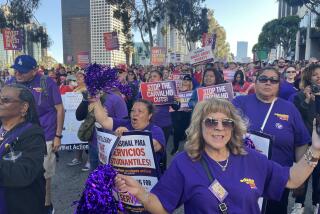L.A. Unified Teachers Poised for Critical Contract Vote : Schools: Balloting begins Tuesday on whether to take a 9% pay cut or authorize a strike and risk losing more money. Most say outcome is too close to call.
- Share via
As Los Angeles Unified School District teachers talk about whether they should authorize their union to call a strike, they describe a disturbing array of emotions: stress, anger, frustration, powerlessness, even foolishness.
“I have been teaching for 25 years and I have never been so exhausted, so frustrated,” said Merrell Frankel of Berendo Junior High. “We have to give the union power, but nobody wants to strike. That’s why my stomach is in a knot.”
Beginning Tuesday, 28,000 teachers will cast secret ballots that some say will lead to a lose-lose situation. They can vote to accept a new contract and take a 9% pay cut. Or they can authorize the union to call a strike and risk losing even more money. The ballots will be counted Thursday.
The ballot decision--and the prospect of a strike in recession-bound 1992--is far more complicated than it was in 1989, when teachers walked out for nine days. Three years ago, they were buoyed by a strong union demand for raises. Now they could end up striking to cushion pay cuts.
In conversations in faculty lounges and hallways on campuses throughout the city, many teachers talked passionately of union solidarity and of the urgent need to send a powerful message to the school board that the staggering budget shortfall cannot be balanced on their backs.
Others, however, are less enthusiastic. Things are different now, they said. Hundreds of thousands of Californians have lost their jobs, so public sympathy is not likely to be on their side. For teachers struggling with their strained family finances, a strike--especially near the holidays--is unfathomable.
“If we don’t strike, we are saying it’s OK to do this to us,” said one high school teacher. But his colleague countered: “How many teachers are going to be able to afford integrity?”
Some murmur that union leaders are out of touch with the Angst teachers are feeling over the impending vote. They say the unanimous vote last week by the 300-member House of Representatives to go on strike rather than accept the pay cuts does not reflect the diversity of opinion among the rank and file.
What they all realize is that this time around, state and school district coffers are empty. There are no hidden pots of money or plentiful reserve funds to dip into.
At issue is the district’s contract offer that would slash teachers’ pay 12% below what they earned two years ago. To eliminate an unprecedented $400-million budget deficit, the Board of Education voted to impose salary reductions on all full-time employees; the plan would take the least from lowest-paid workers and the most from top administrators.
Teachers and administrators would suffer a 9% pay cut for this year in addition to a 3% cut imposed on all full-time employees last year. For a top-paid teacher earning $52,000 a year, such a decrease would slash earnings to $42,000.
UTLA President Helen Bernstein has said that although a pay cut may be inevitable this year, union negotiators are seeking a commitment from the district to seek new ways to spend and save money so that teachers will not take future pay reductions.
Interim Supt. Sid Thompson said he and other district officials have not yet felt a need to begin detailed strike preparations, although informal planning and discussions have taken place.
The district has contingency manuals that instruct principals and others how to handle emergencies, including a strike. Some school principals said last week that they are pulling out those manuals.
“Frankly, we have our fingers and toes crossed it will not be necessary,” Thompson said. “We are waiting and working with UTLA in the hopes we will get through this.”
He said “some positive responses both ways” were exchanged last week between district and union negotiators. Thompson declined to discuss details, but added: “Hope springs eternal that this will lead to some kind of settlement.”
While negotiations continue, leaders of the 28,000-member union are preparing for this week’s critical vote. Today, union representatives from each school are expected to meet at headquarters to collect ballot materials and receive last-minute information to pass on to the rank and file.
“There are not good choices this year, not positive choices,” UTLA spokeswoman Catherine Carey said. “They have to make a choice as to what is the least damaging. That’s what they are grappling with.”
A 50% plus one vote majority is needed to authorize a strike, union officials said. Voter turnout and the weight of the majority vote will be important indicators of teacher resolve.
“If they really decide that voting to authorize a strike is too much of a risk, they will tell us that in their balloting. If they are mad and disgusted enough with what’s going on, they will tell us that too,” Carey said. “We have no idea which way they are going to go.”
And some teachers said they have yet to make up their minds.
“I have mixed feelings. I’m undecided,” said Andrea Lurie, 30, a fourth-grade teacher at Castle Heights Elementary School on the Westside. “If we strike, we give the board what they want--they don’t have to pay us. On the other hand, we want the community to realize the ramifications” of a pay cut.
The prospect of a pay cut has enraged most teachers, who have been forced to do more work with fewer resources. Last year, classrooms were packed with additional students to avoid the expense of hiring more teachers. Supplies have been rationed.
Dozens of young and middle-aged instructors interviewed last week said they are looking for a second job, sending out resumes to other school districts and considering new careers.
One teacher moved out of her apartment and back in with her parents because of the impending cuts. Another said the escrow on her house fell through because she cannot qualify for a loan on a smaller salary. One longtime teacher sold his home in the San Fernando Valley and is preparing to move out of state next year.
“The resumes are going out in the winter,” said Frankel, a former union representative at Berendo, in the Pico-Union district. The top-paid social science teacher at her school, where she has served as an professional adviser to other teachers, she said she will vote to strike: “I’m an expert on inner-city education, but L.A. Unified can’t afford me anymore. I’m walking around for the first time in my career feeling sick.”
Demoralized teachers said it is a constant struggle to keep their bad feelings out of the classroom and away from the students.
Michelle Heron, 37, of 112th Street Elementary School in South Los Angeles, is typical of a teacher who stays late after school to meet with parents and uses her own money to buy special supplies and incentive gifts for children. She said she grew up in the neighborhood and regards helping inner-city children as her mission.
“The stress is starting to get to me. I ask myself: ‘Is it all worth it?’ I keep buying things for my children and spending time with them. But when I look at my paycheck, I feel like a fool sometimes,” she said. “I’m going to keep doing the things I need to do for the children. But I’m scared. I see teachers who aren’t like me.”
The faculty room conversation at Hamilton High School--known as a strong union school that is home to former UTLA President Wayne Johnson--mirrored discussions around the district.
“It’s like I want to have some kind of retaliation, to tell the district that they have mismanaged funds,” said English teacher Christine Redlin, 44. “But voting for a strike is like cutting off your nose to spite your face.”
“A strike is the only way to get public attention,” said Randy Lee, 39, also an English teacher. “I would strike just to keep the union, to force the district to adopt more cost-cutting strategies.”
“But the goals are unclear,” said history teacher Mike Barnhouse. “Now we would strike for how much of a cut. That’s frustrating. It’s like we are being attacked on all sides.”
Others at various schools said their anger over the school board’s handling of the budget crisis has reached such a crescendo that they are forced to take a stand to stave off future pay cuts. Last week another $10.5-million shortfall was identified in this year’s budget, and a $90-million gap is predicted for next fiscal year because of the weak state economy.
“The district has left us no choice. We can see the handwriting on the wall,” said Becki Robinson, a sixth-grade teacher at 1st Street Elementary School and a top union leader.
She said teachers must take a stand to tell district officials that “they cannot continue to go along with business as usual. . . . My feeling is that as difficult as this is, teachers are going to vote for strike.”
At Belmont High School near downtown, social science teacher and union chairman John Lackner said opinions are split.
“There seems to be a developing gulf between the (union) membership and leadership,” he said, citing the unanimous UTLA House of Representatives vote. “All through the negotiations, a lot of teachers felt they really didn’t know what was going on and that some of their feelings were not being enunciated.”
After talking to his colleagues, Lackner said teachers are not prepared to go on strike.
“I think the general public needs to know that there is a diversity of opinion among teachers. I know that is not the politically correct feeling at this point,” he said. “But my gosh, we can’t be lemmings running off a cliff into the sea.”
Times staff writer Henry Chu contributed to this story.
More to Read
Sign up for Essential California
The most important California stories and recommendations in your inbox every morning.
You may occasionally receive promotional content from the Los Angeles Times.










